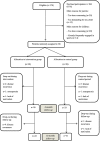Effects of a combined physical and psychosocial training for children with cancer: a randomized controlled trial
- PMID: 30587148
- PMCID: PMC6307314
- DOI: 10.1186/s12885-018-5181-0
Effects of a combined physical and psychosocial training for children with cancer: a randomized controlled trial
Abstract
Background: Physical fitness and psychosocial function is often reduced in children during or shortly after cancer treatment. This study evaluates the effect of a combined physical exercise and psychosocial intervention on cardiorespiratory fitness, muscle strength, body composition, psychosocial function and health-related quality of life (HrQoL). In addition, intervention mediators, applicability and adherence were examined.
Methods: This multicenter randomized controlled trial included 68 children with cancer [mean age 13.2 (SD: 3.1) years; 54% male] during treatment or within 12-months post-treatment. The 12-week intervention consisted of 24 individual physical exercise sessions supervised by a physiotherapist, and 6 psychosocial training sessions for children and 2 for parents. Physical fitness and psychosocial function were assessed at baseline, directly post-intervention and at 12 months' post-baseline. Generalized estimating equations were used to simultaneously assess intervention effects at short and long-term. Additionally, we evaluated within-group differences over time. Potential physical and psychosocial mediators in the intervention effect on HrQoL were examined using the product-of-coefficient test. Applicability and adherence were assessed by trainer-report.
Results: This study was able to compare 26 children who received the study intervention, with 33 children who received usual care. No significant differences in the effects of the intervention were found on physical fitness and psychosocial function at short-term. At 12-months follow-up, significantly larger improvements in lower body muscle strength (β = 56.5 Newton; 95% CI: 8.5; 104.5) were found in the intervention group when compared to the control group. Within-group changes showed significant improvements over time in HrQoL and bone density in both groups. Intervention effects on HrQoL were not significantly mediated by physical fitness and psychological function. Intervention applicability was satisfactory with an average session attendance of 67% and 22% dropout (mainly due to disease recurrence).
Conclusions: This 12-week physical exercise and psychosocial training intervention for children with cancer was applicable and showed satisfactory adherence. We found no significant between-group differences in effect, except for a significant improvement in lower body muscle strength at long-term in the intervention group compared to the control group. Yet, both the intervention and the control group showed improvements in bone mineral density and HrQoL over time.
Trial registration: The trial was registered at the Dutch Trial Registry ( NTR1531 ). Registered 12 November 2008.
Keywords: Cancer; Children; Intervention; Physical exercise; Psychosocial.
Conflict of interest statement
Ethics approval and consent to participate
Patients were recruited from March 2009 to July 2013 in four Dutch university hospitals: VU University Medical Center, Amsterdam; Academic Medical Center, Amsterdam; University Medical Center Utrecht, Utrecht; and Erasmus University Medical Center, Rotterdam. The Medical Ethics Committees of all hospitals approved the study. The trial was registered at the Dutch Trial Registry (NTR1531). Patients and parents individually received written and verbal information about the study, an informed consent form, and an addressed return envelope. Written informed consent was obtained from the parents or legal guardian of each patient, and also separately from each patient aged ≥12 years.
Consent for publication
Not Applicable
Competing interests
The authors declare that they have no competing interests.
Publisher’s Note
Springer Nature remains neutral with regard to jurisdictional claims in published maps and institutional affiliations.
Figures


References
-
- Bianco A, Patti A, Thomas E, Palma R, Maggio MC, Paoli A, et al. Evaluation of fitness levels of children with a diagnosis of acute leukemia and lymphoma after completion of chemotherapy and autologous hematopoietic stem cell transplantation. Cancer Med. 2014;3:385–389. doi: 10.1002/cam4.193. - DOI - PMC - PubMed
-
- Altenburg TM, Lakerveld J, Bot SD, Nijpels G, Chinapaw MJM. The prospective relationship between sedentary time and cardiometabolic health in adults at increased cardiometabolic risk - the Hoorn prevention study. Int J Behav Nutr Phys Act. 2014;11:90. doi: 10.1186/s12966-014-0090-3. - DOI - PMC - PubMed
-
- Owen CG, Nightingale CM, Rudnicka AR, Sattar N, Cook DG, Ekelund U, et al. Physical activity, obesity and cardiometabolic risk factors in 9- to 10-year-old UK children of white European, south Asian and black African-Caribbean origin: the child heart and health study in England (CHASE) Diabetologia. 2010;53:1620–1630. doi: 10.1007/s00125-010-1781-1. - DOI - PMC - PubMed
Publication types
MeSH terms
LinkOut - more resources
Full Text Sources
Medical

